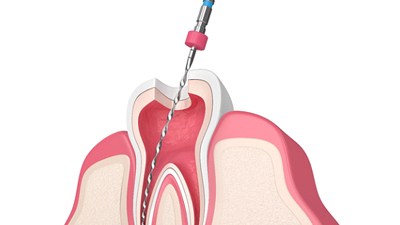Root Canal Therapy – Irving, TX
A Filling for Your Tooth Roots
There are many misconceptions about root canals, but despite what many patients have heard on television, the procedure is not particularly more painful than normal dental procedures; in fact, one of its main purposes is to provide relief from severe toothaches. Furthermore, in many cases, root canal therapy is the only way to save your tooth. Contact us today to learn more about root canal therapy in Irving, or to schedule a first appointment with our team.
Why Choose 21st Century Dental of Irving for Root Canal Therapy?
- Relief from Severe Pain & Infection
- Sedation Dentistry Available
- A Periodontist on Staff Who Also Serves as a Teacher
What is a Root Canal?

Bacteria that enter your tooth can infect the nerves and other tissues they contain. When the nerve in a tooth dies, the infected tissue remains and continues to cause problems. Think of it like a splinter; until it’s taken out, the body will reject it, and you’ll only suffer further pain. Similarly, the only way to treat an infection in your tooth is to remove the source through a procedure called root canal therapy. This treatment will relieve your dental pain and prevent the infection from destroying nearby bone tissue.
Why Do I Need a Root Canal?

The nerve in a tooth can become infected for many reasons. For example, an area of deep decay could negatively affect the nerve, or the accidental fracture of part of the tooth could expose the nerve. Sometimes, just a blow to the tooth can cause the nerve to die and become infected.
In any case, when the nerve becomes infected, the nerve tissue must be removed by either extracting the tooth or performing a root canal (endodontic treatment). Ideally, the procedure should be done before the infection has a chance to get into the bone and cause extreme swelling and pain.
What Happens During a Root Canal Procedure?

During the procedure, we’ll use an appropriate form of sedation that will help you stay relaxed until the procedure is over. We create a small access hole in the tooth and remove the infected tissues within along with any other debris. Root canal files of varying sizes are placed into the hole and scrape and scrub the insides, with water being used to wash away any debris. After that, the tooth needs to be refilled and sealed. In most cases, you’ll need to receive a crown so that you can continue biting and chewing with the affected tooth; the crown will also protect the already-weakened tooth from falling apart or breaking further.
Recovering from a Root Canal

You should be able to return to work the day after the procedure has been performed. The tooth is likely to feel sensitive for a while after a root canal has been performed, so have pain medications such as ibuprofen or naproxen available. Since the crown might not be placed right away, do not chew with the affected tooth until repairs are complete.
Understanding the Cost of Root Canals

When most people come to see us in need of a root canal, their primary concern is pain, but the cost of treatment is at the back of their minds of course. The truth is that there is no one price for root canal treatment because a few factors determine it. Below, we’ll touch on some of the most important ones so you have a better understanding of what to expect.
Factors That Can Affect Root Canal Cost
- Complexity of the Treatment: Not all tooth infections are created equal. Minor ones in front teeth are relatively simple to fix, while deep infections in the molars can be extremely complicated due to them having multiple roots. In short, the more involved your root canal is, the more expensive it will be.
- Sedation: While we do everything we can to make the procedure comfortable with the help of local anesthetic, some patients with a higher level of dental anxiety feel better with sedation to calm them. This is a separate cost from the root canal itself.
- Type of Crown: After receiving a root canal, the newly repaired tooth is topped with a crown to restore its look, strength, and function. Just like the root canal itself, the type of crown (more specifically the material used) will have a unique cost.
- Insurance Coverage: While most dental insurance plans will pay for part of a root canal treatment, the actual percentage will differ from plan to plan.
- Need for a Specialist: We try to perform all root canals in-house at 21st Century Dental, but we may refer a patient to a specialist in certain situations. Visiting an endodontist tends to cost more compared to a general dentist.
Is it Cheaper to Pull My Tooth?
In short, no. The cost of extracting a tooth and then having to replace it is typically much higher compared to getting a root canal and crown. And, just extracting the tooth and leaving the gap is guaranteed to lead to additional dental problems down the line (gum disease, crooked teeth, additional tooth loss) that require more treatments that will far outweigh the price of a single root canal.
Does Dental Insurance Cover Root Canal Treatment?
In most cases, yes! If you have met your deductible for the year, the majority of dental insurance plans will provide coverage. The average amount is about 50% of the procedure, but be sure to check with your provider to confirm the level of your benefits. We can do this for you as well!
Other Options for Making Root Canal Treatment Affordable
If you don’t have dental insurance, we also give our patients access to low-to-no-interest financing through CareCredit and LendingClub. They offer a wide variety of payment plans that will break up the cost of the procedure into small monthly installments. You can sign up and get approved in minutes online. To get started, just click on the buttons at the bottom of this page.
Root Canal FAQs
Can Root Canals Be Prevented?
Fortunately, root canals can be prevented in most cases with a solid oral hygiene regimen. That includes taking care of your teeth at home as well as coming in for a checkup and cleaning every six months. It’s important to adopt other good dental habits too, like not chewing on ice, eating a well-balanced diet, and wearing a mouthguard during sports (even non-contact ones).
How Long Does it Take to Recover from a Root Canal?
Recovering from a root canal usually takes a day or two, but it can vary from patient to patient. For example, if a patient had multiple root canals, then they may need to take a little more time to rest and heal. Patients with physically demanding jobs are encouraged to do the same to avoid delaying the healing process. Across the board, you should get in touch with us if your symptoms seem to be worsening by the three-day mark or you’re experiencing any symptoms of an infection.
What Happens if You Wait Too Long for a Root Canal?
If you postpone a root canal – whether it’s because you aren’t in pain or you’re worried about the cost – it’s very likely that the infection will only worsen. Eventually, the tooth will need to be extracted in order to restore your healthy smile, which we want to avoid whenever possible. That’s why it’s so important that you schedule the necessary treatment when we first bring the problem to your attention.
Note: If you have any questions about the treatment we recommended or your treatment plan, don’t hesitate to ask! We’d be more than happy to share what we found during your exam and provide insight into why restorative care is necessary.
Do Root Canals Make You Sick?
Have you heard the rumor that root canals make you sick? This stems from a study conducted in the 1920s by a man named Dr. Weston Price. Although his research was conducted poorly and his findings have been debunked for decades, the myth continues to spread to this day. The reality is that not getting a root canal when you need one can have serious consequences, including tooth loss or the infection spreading throughout your body.
Do I Still Need a Root Canal if My Toothache Went Away?
If you were dealing with a sharp, stabbing pain or a dull, persistent discomfort, you might be wondering if your symptoms went away because your tooth healed on its own. Unfortunately, that’s not the case. What likely has happened is that the infection has “killed” the nerve of the tooth, causing it to no longer register pain. It’s still just as important that you come in for a root canal so we can stop the infection before the rest of your smile and your overall health are negatively impacted.
